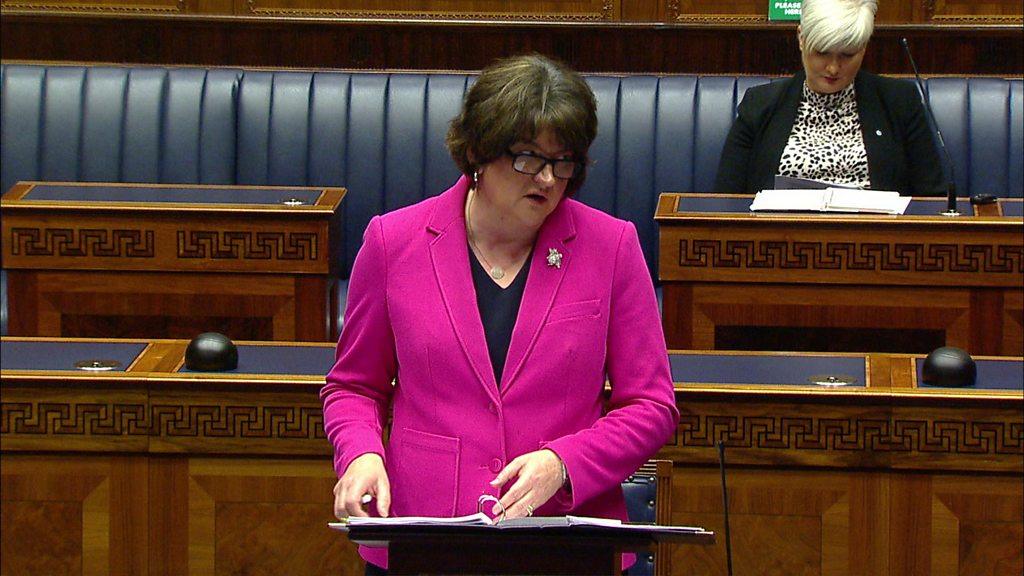Schools to close and tight new hospitality rules in Northern Ireland
- Published
Arlene Foster announces the new restrictions in Northern Ireland
Schools will close from Monday and pubs and restaurants face new restrictions from Friday evening, in a bid to stem cases of Covid-19, First Minister Arlene Foster has said.
The moves are among new restrictions being imposed, external by the executive.
It comes as NI's Department of Health recorded a further 1,217 cases and four more deaths with Covid-19 on Wednesday.
Hospitality businesses will be limited to takeaway and delivery services for four weeks from Friday.
Health officials had warned infections would rise further if both schools and hospitality premises remained open.
Northern Ireland's health department has now recorded 23,115 cases since the pandemic began - a quarter of which have been reported in the past week.
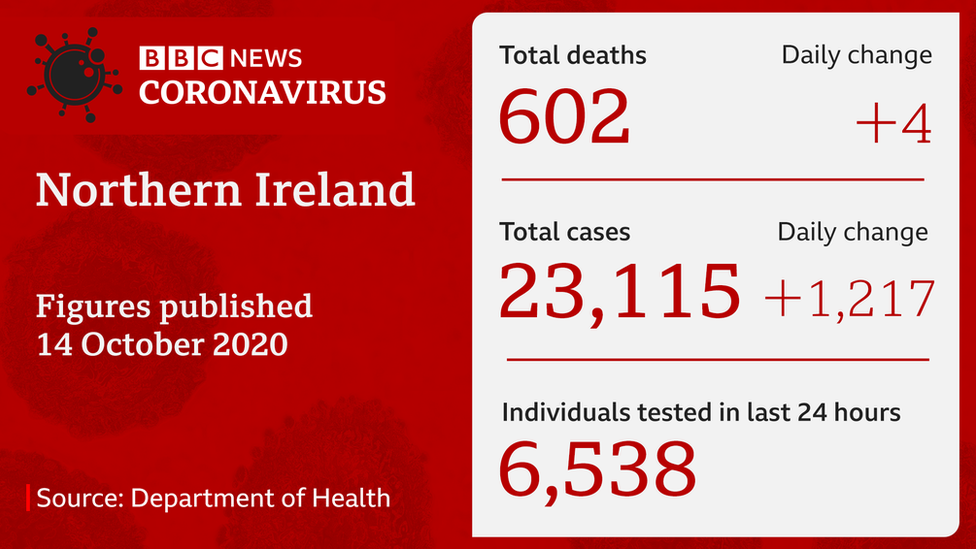
The executive has agreed schools will close for two weeks, including the half-term holiday, until Monday 2 November, when their closure will be reviewed.
Education Minister Peter Weir vowed to oppose any move to extend school closures in Northern Ireland beyond two weeks.
He said lengthening the Halloween mid-term break by a further week of holiday represented a "compromise" position within the Stormont Executive.
The minister said there had been little evidence that schools were significantly contributing to rising Covid-19 numbers.
Sinn Féin's Conor Murphy said his party would have been prepared to back a longer closure but they were "content" with the decision.
Mrs Foster outlined the changes in a statement to assembly members.
Further guidance is being issued that will also advise against unnecessary travel, and the executive will meet on Thursday to discuss further support packages for businesses concerned about what closures will mean for jobs and viability.
Talks ran into the early hours of Wednesday as ministers tried to reach a compromise on a range of decisions, finally agreeing to impose the following measures for four weeks from Friday:
Closure of the hospitality sector, apart from deliveries and takeaways
Other fast-food and takeaway premises to close at 23:00
Off-licences and supermarkets not to sell alcohol after 20:00
No indoor sport or organised contact sport involving mixing of households, other than at elite level
No mass events involving more than 15 people (except for allowed outdoor sporting events where the relevant number for that will continue to apply);
Close-contact services such as hairdressers and beauticians to close - apart from those relating to the continuation of essential health interventions and therapeutics.
Mobile hairdressers and make-up artists - also classed as close contact services - prohibited from working in homes
Gyms to remain open for individual training but no classes permitted
Places of worship to remain open but face coverings mandatory when entering and exiting
While there was no specific mention of hotels, it is understood they will also be closing for four weeks.
Economy Minister Diane Dodds said she was "urgently engaging with executive colleagues to clarify the specifics of these new restrictions, and the potential impact on hotels, before they come into effect".
There is also likely to be more guidance on the likes of soft play areas, cinemas and swimming pools.
There are new restrictions coming into place for weddings, civil ceremonies and funerals, which will be limited to 25 people from Monday with no receptions permitted.
Face coverings will not be obligatory for such ceremonies in places of worship.
Ministers have agreed no additional restrictions will be placed on shops, but there will be "urgent engagement" with the sector about extra measures to prevent further spread of the virus.
Driving lessons will be allowed to continue.
Northern Ireland's new restrictions - in 60 seconds
The current restrictions on household mixing are expected to remain as they are.
That would mean no mixing of households in private homes - with exceptions including those joined in social bubbles - and gatherings in gardens limited to six people from no more than two households.
'Time-limited intervention'
Mrs Foster said the executive hoped the measures would reduce virus transmission rates, while reinforcing public health messaging.
"A lot of these decisions will have huge impacts - we're very determined this will be a time-limited intervention," she told the assembly.
She also told the assembly there had been 485 coronavirus-related incidents schools - many involving a single case - and fewer than 10 schools required support for more than two cases.
"There are other issues around school gates and transport and issues like that but we are going to work with the education department about how we can minimise risks," she added.


White smoke emerged shortly after 00:30 - the tradition of late Stormont nights making a return once more.
Ministers had reconvened at 23:00 after tensions erupted earlier, with the SDLP and Alliance complaining they had been given too little time to scrutinise the proposals.
One source said when the meeting first got under way, the atmosphere was "horrendous", but when ministers returned for the second time it's understood tempers had calmed and the midnight meeting was a more sombre affair.
The nature of decision-making at Stormont sees five parties sharing power in a mandatory coalition - and their views have differed greatly at times during the pandemic.
It appears the Democratic Unionist Party (DUP) and Sinn Féin reached a compromise over the timing of school closures - for now - and whether to apply hospitality measures throughout Northern Ireland.
Advice from health officials was that NI-wide restrictions had to be imposed by Friday.
The executive seems to have listened to that recommendation, but some are asking why the parties laboured so long over the proposed plan, given the urgency of the situation.
But these are seismic decisions: every step back into what resembles the original lockdown has ramifications.
Ministers will also be facing questions about why they appear to have chosen to diverge from some of the health officials' original advice.
Read more from Jayne.

The executive has also agreed to advise universities and further education colleges to run courses online.
Queen's University Belfast has confirmed teaching will be carried out online for the rest of the semester, unless face-to-face work is considered "essential or unavoidable."
Deputy First Minister Michelle O'Neill, who is self-isolating after a relative tested positive for coronavirus, said there would be no changes to childcare arrangements.
The Sinn Féin vice president said the executive had given "painstaking consideration" to next steps.
"We will do everything we possibly can to make sure there are protections in place for businesses, workers and families," she said.
Allow X content?
This article contains content provided by X. We ask for your permission before anything is loaded, as they may be using cookies and other technologies. You may want to read X’s cookie policy, external and privacy policy, external before accepting. To view this content choose ‘accept and continue’.

In other coronavirus-related developments:
Northern Ireland's Nightingale hospital has been re-established due to Covid-19 pressures across NI's health trusts
There will be a ban on all household visits in the Republic of Ireland from Thursday night, excluding arrangements for childcare and on compassionate grounds
The Irish cabinet also agreed to move the border counties of Donegal, Cavan and Monaghan to the second highest level of restrictions
In Derry and Strabane, one of the UK's worst affected areas, visits to Altnagelvin Hospital have been banned following a surge in Covid cases
People from parts of England, Scotland and Northern Ireland that have high rates of coronavirus will be banned from travelling to Wales from Friday

Where are the current hotspots?
There are several local hotspots in the UK where cases have spiked in recent weeks.
The orange areas on the map below are those currently seeing the highest number of cases per 100,000 people.
Sorry, your browser cannot display this map

If you are reading this page on the BBC News app, you will need to visit the mobile version of the BBC website to submit your question on this topic.

Find out how the pandemic has affected your area and how it compares with the national average (last updated 10 Oct):


Schools: How are pupils being kept safe?
Weddings: How many people can attend?
Going out: When and how are pubs allowed to open?

- Published12 October 2020
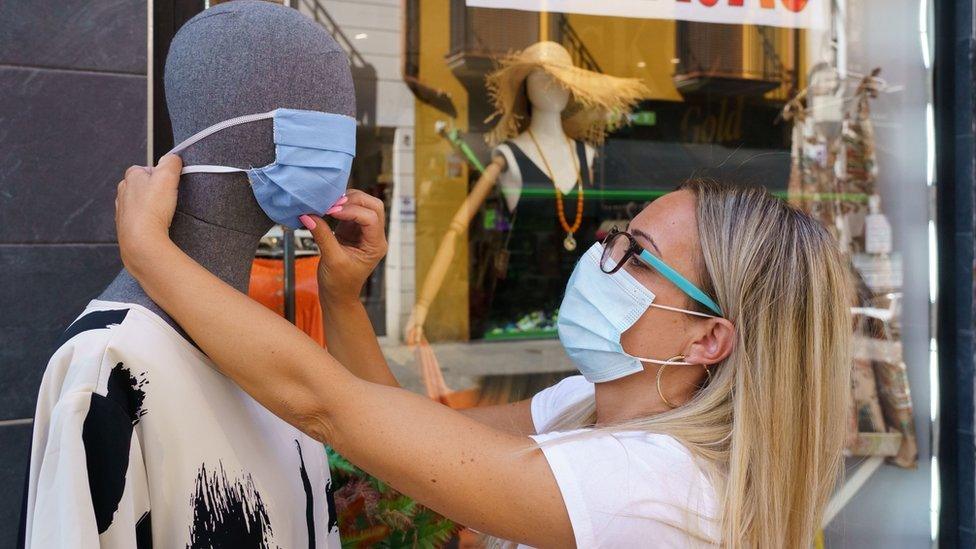
- Published10 October 2020
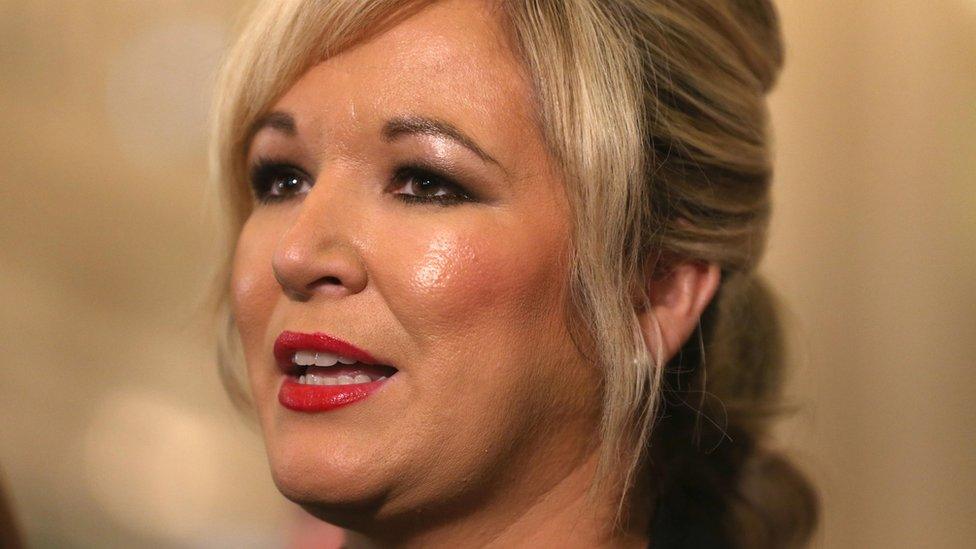
- Published10 October 2020
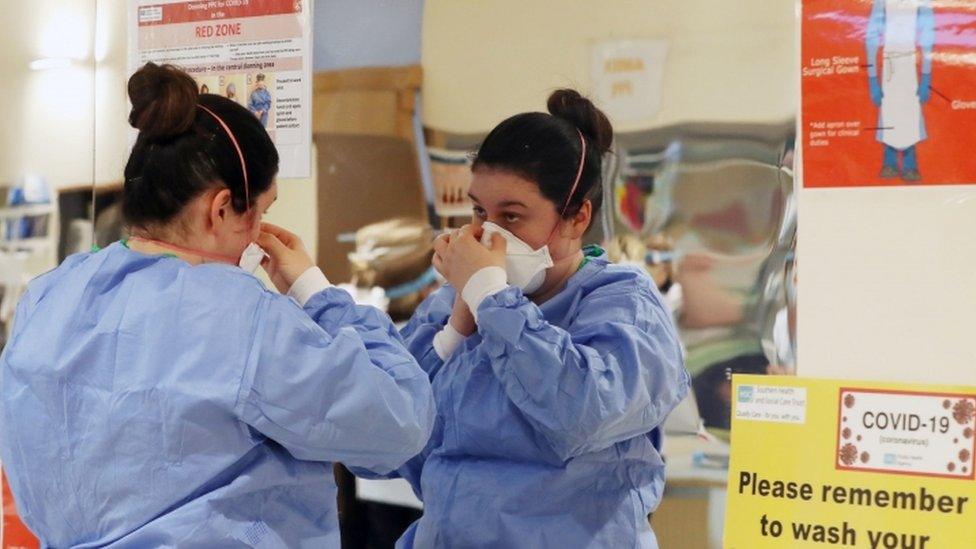
- Published14 October 2020
